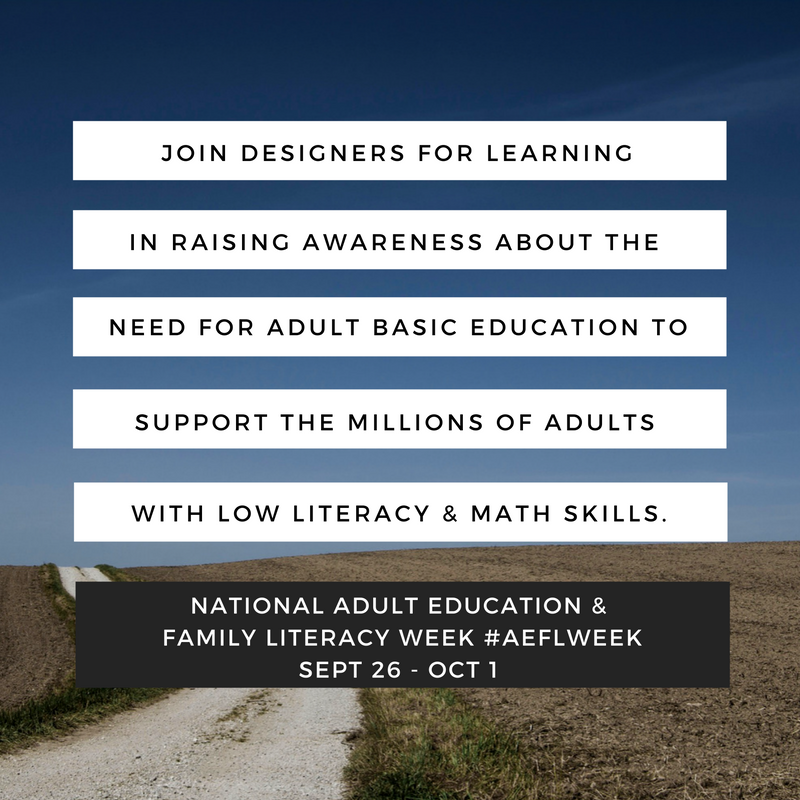Week 3 Course Announcements
Welcome to week 3 of the #OpenABE service-MOOC! The following are reminders and updates as the majority of us work our way through Module 1 of the course. In addition, one of our objectives in this course is to help raise awareness about the adult basic skills gap. To that end, we encourage you to participate in National Adult Education and Family Literacy week activities running from September 26th to October 1st this week:
“National Adult Education and Family Literacy Week raises public awareness about the need and value of adult education and family literacy in order to leverage resources to support access to basic education programs for the 36 million U.S. adults with low literacy skills. Advocates across the country use this opportunity to elevate adult education and family literacy nationwide with policymakers, the media, and the community.”
Please follow awareness activities, blog posts, and twitter under the #AEFLweek hashtag. In addition, feel free to use these #AEFL week resources to spread awareness, as well.
Live Webinar and Recordings
This Week – What To Expect
In this third week of the course, we continue our focus on the learners, their needs, and the instructional context of the adult basic education “classroom”. Katie Corcoran, a participant in our #OpenABE service-MOOC, shares her perspective on our learners in her recent blog post where she notes:
“Before this class (we’re already one week in), I knew there was a percentage of the population that didn’t obtain their high school diploma; I knew there were adults that couldn’t read very well; I knew there were people that, for whatever reason life threw at them, weren’t achieving at their fullest potential. But it was like hearing that it gets cold in Canada during the winter. Without seeing pictures of the snow drifts or temperature and wind chill data, it’s hard to wrap your mind around the enormity of it.”
Katie’s blog reflection captures the spirit of what we are attempting to achieve in Module 1 where we consider the importance of empathy in the practice of instructional design. In the design literature, there is consensus that understanding and focusing on the end user (the learner in instructional design) during the design process is essential to the success of the final product.
- Explore your ability to identify with learners’ thoughts and feelings (e.g., their hopes, dreams, and fears, their circumstances, and what they want to accomplish) as a key quality of the instructional design process.
- Practice the process of empathy in design practice by following a 4-phase empathy framework within a visual thinking exercise.
- Apply the empathy framework to discover, immerse, connect, and then detach with learner personas that will guide your instructional design process.
- Reflect on how having empathy toward your learners will help you in your instructional design process.
- Contemplate the reasons why adult learners desire to complete adult basic education.
- Identify learner needs relevant to completing adult basic education courses and programs, including possible pain points that might affect the completion process.
- Consider potential gaps in knowledge, skills, motivation, environment, and communication.
- Describe the characteristics of the instructional setting setting for adult basic education learners (e.g., face-to-face, blended, or online).
A Word About Assignment Due Dates
We’ve received a few questions about due dates from students worried about “getting behind” in the course. Please note that the due dates we’ve set for assignments in the course merely offer target completion dates to get us (as a class) through this 12-week course before December 4th. In the past, most students reported the course took 40 hours to complete. Therefore, our “due dates” assume 3 to 4 hours per week x 12 weeks = 40 hours total. However, we know you will have less (or more) time to devote to the course during any given week, so use the due dates as a general guide to pace your course progress.
Reminder – Optional Group Collaboration
Thank you for your service!
Thank you very much for joining us in this service-learning experience. The course facilitators will provide weekly announcements like this that will serve as progress checkpoints with reminders and updates regarding course progression. A link to the roster of Announcements appears in the left sidebar of each course page. We look forward to working with you!
Help Us Spread the News!
Please help us spread the news about this upcoming course by forwarding this announcement to other interested colleagues or students. Do you have comments or questions about our projects? Would you like to get involved with our organization? Please connect with us at:
